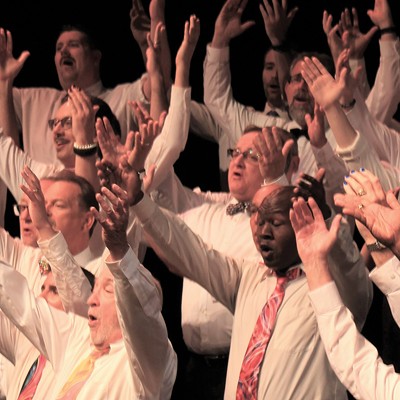It was funny, but it was awful," the character Martha says in Edward Albee's 1962 classic, Who's Afraid of Virginia Woolf? Middle-aged Martha is talking about a boxing match she had with her professor husband, George; he was publically humiliated, and it was awfully funny.
"Funny but awful" describes a great deal of Virginia Woolf. In Winding Road Theater Ensemble's current production, Martha is played by Lesley Abrams, who has a smoky voice and a gruff laugh. Abrams bursts into a grim guffaw whenever George (Bill Epstein) says something particularly poisonous, either to her or to the two young guests they've dragged home: Nick (Robert Anthony Peters), a new professor, and his wife, Honey (Amy Erbe).
Most of the time, we laugh with Martha. Much of Virginia Woolf is darkly entertaining, and laughter and game-playing are themes throughout. At one point, Nick—much younger than both George and Martha—calls his hosts "vicious children." Indeed. Despite the fact that much of George and Martha's bitterness stems from feeling old and "past it," their anarchic spirit and relish for "games" is eerily childlike. As George observes, the insane ones "don't grow old ... not in the usual way."
The darkness and insanity bubbling up from under a fairly tame surface—two academic couples having drinks—is perhaps what has made Virginia Woolf so fascinating to several generations of theatergoers. The play is now such a staple that it's difficult to remember how shocking it seemed at first. Winding Road reminds us in the program that although the Pulitzer jury wanted to give the drama prize to Albee's play, the Pulitzer advisory board overruled the choice, objecting to the play's "controversial use of profanity and sexual themes." No Pulitzer Prize for Drama was awarded that year.
Still, the play was a huge critical and financial success, and was made into a classic film starring Elizabeth Taylor and Richard Burton.
In the play's first act, we get a sense of how Albee's coarse language must have come across to a contemporary audience. When Honey first asks to use the bathroom, she shyly suggests that she needs to "put some powder on my nose."
"Show her where we keep the euphemism," George quips. But after imbibing a succession of drinks, the characters are soon throwing around words like "scrotum" and "motherfucker." We've come a long way from euphemisms.
Director and set-designer Terry Erbe has staged the play rather ingeniously. He ignores the Cabaret Theater's small stage entirely, instead going for theater-in-the-round. He centers the action in the middle of the room, right where the audience would usually be seated. Chairs for audience members are placed on all four sides, so that we are peering in on the actors. This creates an intimate, voyeuristic feel.
Amy Erbe also designed the costumes; she gives her Honey a lime-green suit and gorgeous, caramel-colored pumps. These shoes come off, however: Honey eventually pads around the stage barefoot, clutching a bottle of brandy. The other characters also subtly disrobe as the play progresses. Nick sheds his shiny coat and tie, and Martha changes from a dress into slacks. Erbe has Martha in leopard prints throughout, which serve as an effective if not terribly subtle reminder of Martha's animal ferocity.
As an actor, however, Erbe disappoints. Her drunken shenanigans are shrill and unconvincing. Certainly, Honey is a challenging part, as much of her character is conveyed through garbled, drunken speech. Still, in the hands of the right actor, the audience can viscerally experience her growing understanding of the situation around her. Erbe's interpretation is merely incoherent; one is never quite sure what her Honey does or does not understand.
As George, Epstein seems to have miraculously shed 20 or so years to play a man in his 40s. His George possesses a manic, youthful spirit and a surprising reserve of strength. I last saw Epstein as Shakespeare's King Lear at Beowulf Alley Theatre, where, before our eyes, he became frail and doddering, seemingly near death. The contrast here is impressive.
Still, one wishes for a little more from Epstein in the climactic scenes where George makes a final, devastating bid for the upper hand over Martha. Epstein's sonorous voice and dry delivery work well when George is being reserved and mean—but by the end of the play, one wonders why Epstein is keeping George's affect so flat. His outbursts of rage don't quite convince.
Similarly, Abrams is excellent when Martha is lively and cruel, but one is left wishing she'd dug a little deeper in Martha's final moments of vulnerability. The last scenes of Albee's script are so rich that some productions of Woolf have left me drained and shaken as the final lights went down. This time, I felt moved, but with a nagging sense that Epstein and Abrams could have brought more to the characters.
By contrast, Peters inhabits Nick with a subtle depth, fleshing out someone who can easily come across as a nonentity. He builds Nick's drunkenness slowly; we can see Nick at first resist the odd situation, and then gradually feed off George's crazy energy.
At the end of the production, my companion (a veteran with me of other Virginia Woolf productions) observed, "I really want to go home and watch the Burton and Taylor one now."
This sums the case up nicely: Winding Road's production is often entertaining, and in parts is very well done. But it merely whets your appetite for the play's potential.








